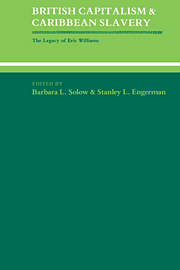Book contents
- Frontmatter
- Contents
- List of Contributors
- Preface
- British Capitalism and Caribbean Slavery: The Legacy of Eric Williams: An Introduction
- Part I Slavery as an Economic Phenomenon
- Part II Caribbean Slavery and the Industrial Revolution
- Part III The Decline of the British West Indies
- Part IV The Basis of Abolition and Emancipation
- Part V Capitalism and Slavery in Historical Perspective
British Capitalism and Caribbean Slavery: The Legacy of Eric Williams: An Introduction
Published online by Cambridge University Press: 15 December 2009
- Frontmatter
- Contents
- List of Contributors
- Preface
- British Capitalism and Caribbean Slavery: The Legacy of Eric Williams: An Introduction
- Part I Slavery as an Economic Phenomenon
- Part II Caribbean Slavery and the Industrial Revolution
- Part III The Decline of the British West Indies
- Part IV The Basis of Abolition and Emancipation
- Part V Capitalism and Slavery in Historical Perspective
Summary
Eric Williams, in Capitalism and Slavery, presented four important themes: (1) slavery was an economic phenomenon; and thus racism was a consequence, not the cause, of slavery; (2) the slave economies of the British West Indies caused (the strong version) or contributed greatly (the weaker version) to the British Industrial Revolution; (3) after the American Revolutionary War the slave economies declined in profitability and/or importance to England; and (4) abolition of the slave trade and emancipation of the slaves in the British West Indies were driven not by philanthropy or humanitarianism but by economic motives within England. While all of these themes have been debated, it is the second and fourth that have had the most impact upon subsequent scholarship, and each has become a “Williams thesis.”
slavery as an economic phenomenon To Eric Williams, modern slavery in the Americas was not racial in origin, nor the result of color, inherent inferiority, or climate. Rather, it was a matter of economic profitability: “a specific question of time, place, labor and soil.” Williams's explanation derives from the economic arguments presented in the nineteenth century by Wakefield, Merivale, and Cairnes. In a new colony, with simple agricultural technology and where land is abundant and therefore cheap, there will be no voluntary supply of labor, because “the laborer [will] exercise his natural inclination to work his own land and toil on his own account” (p. 5). In these circumstances, if there is to be a labor supply, it must be coerced.
- Type
- Chapter
- Information
- British Capitalism and Caribbean SlaveryThe Legacy of Eric Williams, pp. 1 - 24Publisher: Cambridge University PressPrint publication year: 1988

